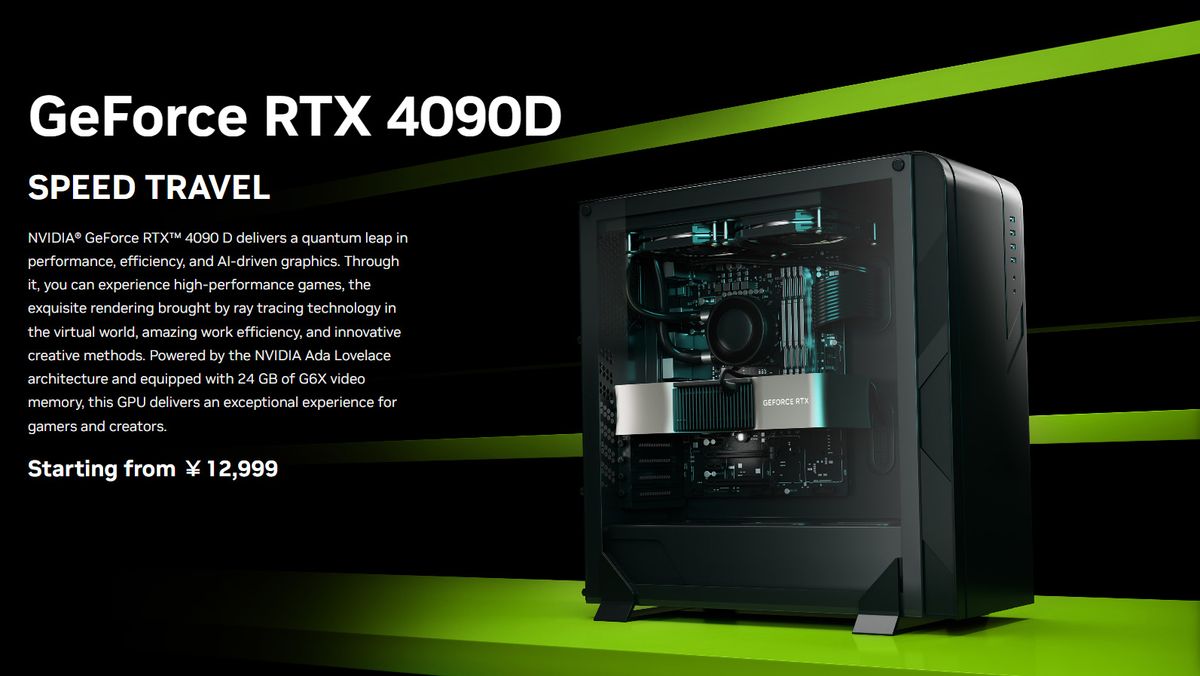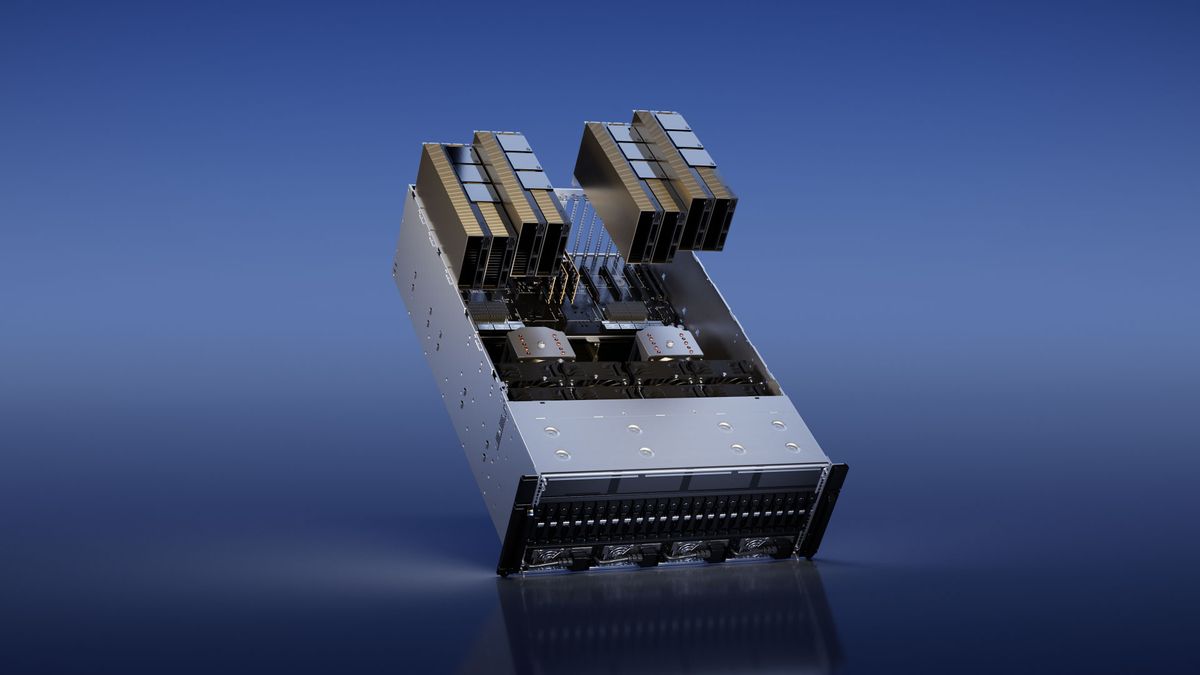Weren't H20s on the new ban list?China is back to ordering huge amounts of NVIDIA GPUs (H20), an analyst expects an additional ~10 billion $ of added revenue as a result.
You are using an out of date browser. It may not display this or other websites correctly.
You should upgrade or use an alternative browser.
You should upgrade or use an alternative browser.
NVIDIA discussion [2024]
- Thread starter pharma
- Start date
Bondrewd
Veteran
If not, they'll be banned real soon too.Weren't H20s on the new ban list?
DavidGraham
Veteran
Long story short: H20 is safe from the recent ban updates, as such they are being shipped to China.Weren't H20s on the new ban list?
Update 4/4/2024 6:15am PT: We have been notified that the refined and 'clarified' U.S. sanctions do not impact Nvidia's existing sanctions-compliant GPUs for China, specifically the H20 and RTX 4090D.

'Clarified' US sanctions do not impact Nvidia RTX 4090D 'Dragon' or H20 GPUs [Updated]
The U.S. issued a 'clarification' document on the existing sanctions, which contrary to earlier reports do not impact existing sanctions-compliant GPUs shipping into China.
Last edited:
DavidGraham
Veteran
Musk is seeking to obtain a 100K NVIDIA GPUs (H100) to train Grok3.
In other news, Musk revealed the Tesla already owns more than 30K H100 GPUs, while Twitter owns between 26K and 30K H100 GPUs.
In other news, Musk revealed the Tesla already owns more than 30K H100 GPUs, while Twitter owns between 26K and 30K H100 GPUs.
Surely that means both have more than 30k, otherwise X would be 4th.In other news, Musk revealed the Tesla already owns more than 30K H100 GPUs, while Twitter owns between 26K and 30K H100 GPUs.
Such monumental amounts of expensive processors essentially just being put to work for the most useless damn things. Grok is an exercise in technological vanity that will never accomplish anything. And I dont say that as somebody who just downplays/hates anything Elon is involved with by default like some(still a big SpaceX fan for instance).

Nvidia's H100 AI GPU shortages ease as lead times drop from up to four months to 8-12 weeks
The supply constraints of Nvidia's H100 AI GPUs is finally evaporating
DavidGraham
Veteran
Tesla is buying so many NV GPUs that it's projected to be among the biggest customers outside of hyperscalers. Many sovereign countries are also acquiring NV GPUs.
Major AI collaboration between Japan and USA involving NVIDIA, ARM and Amazon.
And on other news, Morgan Stanley is saying the customers continue to consider NVIDIA GPUs to be the highest ROI for them, which meant they prioritize NV GPUs over the competition: "Faced with limited slots for AI processors, we are seeing some of the appetite for alternatives taking a back seat to the highest ROI processor, which continues to be NVIDIA."
Major AI collaboration between Japan and USA involving NVIDIA, ARM and Amazon.
And on other news, Morgan Stanley is saying the customers continue to consider NVIDIA GPUs to be the highest ROI for them, which meant they prioritize NV GPUs over the competition: "Faced with limited slots for AI processors, we are seeing some of the appetite for alternatives taking a back seat to the highest ROI processor, which continues to be NVIDIA."
Last edited:
everyone will be buying amd cards cause its all you will be able to get . Lets hope rdna 4 is good for gamingOh lovely.
Can't wait to see what this shit does to the gaming GPU market.
arandomguy
Regular
The production bottleneck for these is advanced packaging and HBM, not actual chip production. 5nm wafer throughput itself (wafer, not chip) I believe is several times TSMC's CoWoS throughput.
With the Blackwell rumours there could be common production overlap with the highest end MCM design but otherwise at the moment there isn't really any with consumer side products.
I think the reality people might want to face is just that consumer are willing, even if they aren't wanting to, pay escalating prices for consumer GPUs.
The bigger possible disruption would be if edge AI use cases take off and benefit from GPUs over NPU. As such you'd suddenly get way more people looking for higher end GPUs.
With the Blackwell rumours there could be common production overlap with the highest end MCM design but otherwise at the moment there isn't really any with consumer side products.
I think the reality people might want to face is just that consumer are willing, even if they aren't wanting to, pay escalating prices for consumer GPUs.
The bigger possible disruption would be if edge AI use cases take off and benefit from GPUs over NPU. As such you'd suddenly get way more people looking for higher end GPUs.
AMD will be chasing after the market NVIDIA couldn't fulfill on AI space so doubt RDNA4 GPUs will be plentiful either.everyone will be buying amd cards cause its all you will be able to get . Lets hope rdna 4 is good for gaming
$2-3k 5090. $1500 5080. Below that, 10-15% more performance at any given tier for the same or higher prices.Oh lovely.
Can't wait to see what this shit does to the gaming GPU market.
I mean, yea, it has. As annoying and outrage-addicted as many consumers can be(especially in the gaming community), there's numerous examples of widespread outrage causing companies to reverse course and offering something better for consumers.Well to be fair, has complaining on the internet ever solved anything?
But you're mostly right that consumers, even if they're unhappy, tend to just to bend over and take it if they want something badly enough. Not many people are actually all that principled when it comes down to it, in my experience.
DavidGraham
Veteran
Amazon announced it will continue to significantly grow it's fleet of NVIDIA GPUs for the foreseeable future, alongside their custom made chips Trainium and Inferentia.
Amazon cited that it's not about chips alone, but about the whole stack, especially scaling out servers and the ecosystem.
Amazon stressed how the new solutions and start ups are having a hard time being successful in the AI space.
Amazon says NVIDIA is yet to be matched, citing several advantages.

 www.nextplatform.com
www.nextplatform.com
it’s not a zero-sum game, the way we see it. Because of this exponential growth, there will continue to be phenomenal growth in our fleet of Nvidia GPUs, but at the same time, we’ll continue to find the opportunistic way to land Trainium and Inferentia for external and internal use
Amazon cited that it's not about chips alone, but about the whole stack, especially scaling out servers and the ecosystem.
“It’s really hard to build chips,” “It’s even harder to build servers, and manage and deploy a fleet of tens of thousands, if not hundreds of thousands, of these accelerators. But what is even more challenging is building a developer ecosystem that takes advantage of this capability. In our experience, it’s not just about silicon. Silicon is part of the offering. But then, how do we provision it as a compute platform? How do we manage and scale it?
what is paramount? How easy to use is that solution? What developer ecosystem is available around your offering? Basically, how quickly can customers get their job done?
Amazon stressed how the new solutions and start ups are having a hard time being successful in the AI space.
“It has to have a developer community around it for it to have a traction in the space,” Kapoor says. “If there’s a startup that is able to accomplish that feat, then great, they’ll be successful. But it’s important to really view from that lens where it needs to be performant, needs to be cheap, it needs to be broadly available, and really easy to use, which is really, really hard for even large corporations to actually get it right.”
Amazon says NVIDIA is yet to be matched, citing several advantages.
That said, there will continue to be sustained demand for Nvidia products. Many of the new foundational models are being built on the vendor’s GPUs because the research and scientific communities have a lot of experience building and training AI models with Nvidia hardware and software, Kapoor says
Also, Nvidia will continue expanding the edges in terms of raw performance that a system can provide. The GPU maker is “really, really good at not only building silicon, but these systems, but they’re also phenomenal at optimizing performance to make sure that their customers are getting most out of these really, really expensive accelerators,” he says

AWS Hedges Its Bets With Nvidia GPUs And Homegrown AI Chips
There was a time – and it doesn’t seem like that long ago – that the datacenter chip market was a big-money but relatively simple landscape, with CPUs
 www.nextplatform.com
www.nextplatform.com
DavidGraham
Veteran
By the end of 2024, Microsoft is going double it's arsenal of AI GPUs to 1.8 million GPUs, mostly from NVIDIA. Which means buying around 900K of GPUs.
Also by 2027, they plan to spend around a 100 billion dollars on GPUs and data centers.

 www.trendforce.com
www.trendforce.com
Also by 2027, they plan to spend around a 100 billion dollars on GPUs and data centers.
According to sources cited by the American news outlet Business Insider, Microsoft plans to double its inventory of GPUs to 1.8 million, primarily sourced from NVIDIA.
The sources cited by the same report further revealed that Microsoft plans to invest USD 100 billion in GPUs and data centers by 2027 to strengthen its existing infrastructure.

[News] Microsoft Reportedly Stockpiling AI Chips to Boost Hardware Capability | TrendForce Insights
According to sources cited by the American news outlet Business Insider, Microsoft plans to double its inventory of GPUs to 1.8 million, primarily sou...
Last edited:

NVIDIA To Collaborate With Japan On Their Cutting-Edge ABCI-Q Quantum Supercomputer
NVIDIA is all set to aid Japan in building the nation's hybrid quantum supercomputer, fueled by the immense power of Team Green's products.
...
This platform is an open-source resource* that allows users to leverage quantum-classical applications. CUDA-Q will act as an integral part of the supercomputer, allowing the ease of integrating relevant CPUs and GPUs onboard. Moreover, Team Green plans to accommodate 2,000 of NVIDIA's H100 AI GPUs, which the latest NVIDIA Quantum-2 InfiniBand interconnects.
...
Japan's ABCI-Q supercomputer is a part of the country's technological innovation phase, where they plan on capitalizing on the benefits of current-gen technologies like quantum computing and AI to excel in mainstream consumer industries.
* CUDA-Q is inherently interoperable with existing classical parallel programming models such as CUDA, OpenMP, and OpenACC. This compiler implementation also lowers quantum-classical C++ source code representations to binary executables that natively target cuQuantum-enabled simulation backends.
Nikkei Asia reports that the National Institute of Advanced Industrial and Technology (AIST), Japan, is building a quantum supercomputer to excel in this particular segment for prospects. The new project is called ABCI-Q & will be entirely powered by NVIDIA's accelerated & quantum computing platforms, hinting towards high-performance and efficiency results out of the system. The Japanese supercomputer will be built in collaboration with Fujitsu as well.
NVIDIA To Collaborate With Japan On Their Cutting-Edge ABCI-Q Quantum Supercomputer
NVIDIA is all set to aid Japan in building the nation's hybrid quantum supercomputer, fueled by the immense power of Team Green's products.wccftech.com
...
This platform is an open-source resource* that allows users to leverage quantum-classical applications. CUDA-Q will act as an integral part of the supercomputer, allowing the ease of integrating relevant CPUs and GPUs onboard. Moreover, Team Green plans to accommodate 2,000 of NVIDIA's H100 AI GPUs, which the latest NVIDIA Quantum-2 InfiniBand interconnects.
...
Japan's ABCI-Q supercomputer is a part of the country's technological innovation phase, where they plan on capitalizing on the benefits of current-gen technologies like quantum computing and AI to excel in mainstream consumer industries.
* CUDA-Q is inherently interoperable with existing classical parallel programming models such as CUDA, OpenMP, and OpenACC. This compiler implementation also lowers quantum-classical C++ source code representations to binary executables that natively target cuQuantum-enabled simulation backends.
I didn't realise Nvidia were involved in quantum computing.
I didn't realise Nvidia were involved in quantum computing.
Nvidia invented everything.
Similar threads
- Replies
- 22
- Views
- 2K
- Replies
- 29
- Views
- 3K
- Replies
- 7
- Views
- 985
- Replies
- 1K
- Views
- 92K

